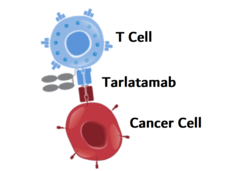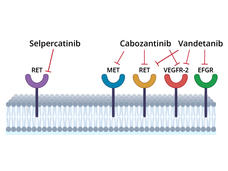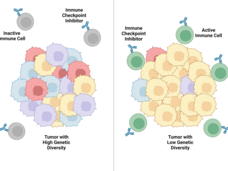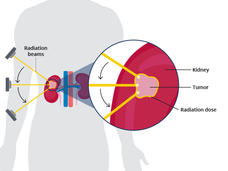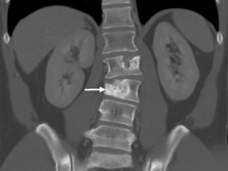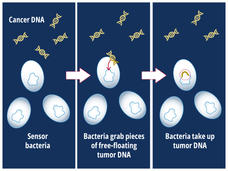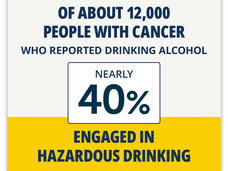Cancer Currents: An NCI Cancer Research Blog
A blog featuring news and research updates from the National Cancer Institute. Learn more about Cancer Currents.
-
What Comes after NCI-MATCH? NCI’s New Precision Medicine Cancer Trials
NCI’s James H. Doroshow, M.D., reflects on the accomplishments of NCI-MATCH, a first-of-its-kind precision medicine cancer trial, and gives an overview of three new successor trials: ComboMATCH, MyeloMATCH, and iMATCH.
-
Tarlatamab Shows Promise for Some People with Small Cell Lung Cancer
Tarlatamab, a new type of targeted immunotherapy, shrank small cell lung cancer (SCLC) tumors in more than 30% of participants in an early-stage clinical trial. Participants had SCLC that had progressed after previous treatments with other drugs.
-
Groundbreaking Trial Results Expand Treatment Options for Some People with Bladder Cancer
For the first time in decades, people with advanced bladder cancer have more effective treatment options. New clinical trial results mark a pivotal moment following years of little progress, bladder cancer experts believe.
-
Molecular Burglary: Cancer Cells Hijack Energy from Immune Cells
A new study shows that, in some tumors, a subset of cancer cells can drain mitochondria, the tiny structures within cells that produce energy, from T cells and use them for their own energy needs.
-
FDA Amends Approval of Pembrolizumab to Treat Stomach and Esophageal Junction Cancer
FDA has changed its 2021 approval of pembrolizumab (Keytruda) along with trastuzumab (Herceptin) and chemotherapy for treating HER2-positive stomach or GEJ cancer. The agency also announced a new approval of pembrolizumab for HER2-negative forms of these same cancers.
-
Selpercatinib Slows Progression of RET-Positive Lung, Medullary Thyroid Cancers
For people with lung cancer and medullary thyroid cancer whose tumors have changes in the RET gene, selpercatinib improved progression-free survival compared with other common treatments, according to new clinical trial results.
-
A Better Biomarker for Cancer Immunotherapy?
A new study, conducted largely in mice, may help explain why a currently used molecular marker—called mismatch repair deficiency—doesn’t always work to predict which patients will respond to immunotherapies called immune checkpoint inhibitors.
-
FDA Authorizes Blood Test for Assessing Risk of Hereditary Cancers
The Food and Drug Administration (FDA) for the first time has granted marketing authorization for a blood test, the Invitae Common Hereditary Cancers Panel. The test detects inherited genetic changes that increase the risk of developing certain cancers.
-
Study Finds Shortcomings in Monitoring Caregivers' Emotional Health
In a survey of more than 100 US community cancer clinics, only 16% routinely screened informal caregivers of their patients for distress. In contrast, more than 90% regularly screened patients for distress and provided referrals to supportive care services.
-
SBRT Emerging as an Important Treatment for Early-Stage Kidney Cancer
Stereotactic body radiotherapy was effective in people with localized kidney cancer who weren’t able to have surgery to remove their tumor, a clinical trial has shown. No patients had their cancer start growing or died from cancer over the next 5 years.
-
Trial Results Confirm Effectiveness of Atezolizumab Against a Rare Sarcoma
Treatment with atezolizumab (Tecentriq) shrank tumors in about 40% of people with alveolar soft part sarcoma, including one complete response, new clinical trial findings show. Some people were later able to stop treatment without the cancer returning.
-
ENLACE Study Explores Colorectal Cancer in Hispanic and Latino People
The ENLACE study is the first to use cutting-edge technologies to describe the molecular features of colorectal tumors in Hispanic and Latino people. The study’s goals are to improve treatments and increase Hispanic/Latino engagement in cancer research.
-
Oncolytic Virus Enables the Immune System to Attack Tumors
A cancer-infecting virus engineered to tamp down a tumor’s ability to suppress the immune system shrank tumors in mice, a new study shows. The modified oncolytic virus worked even better when used along with an immune checkpoint inhibitor.
-
Is AI Ready to Play a Leading Role in Colorectal Cancer Screening?
Using computer-aided detection (CAD) during a colonoscopy doesn’t help doctors find the growths most likely to become colorectal cancer, two studies find. Researchers agreed that CAD, which is aided by artificial intelligence technology, needs further refinement.
-
Can Artificial Intelligence–Driven Chatbots Correctly Answer Questions about Cancer?
Can AI chatbots give people accurate information about cancer and its treatment? The answer appears to be: Not yet. Results from two studies have found that, although AI chatbots can gather cancer information from reputable sources, their responses to questions about treatment and other topics can include errors and omissions.
-
Researchers Develop a Potential “Universal” CAR T-Cell Therapy for Blood Cancers
Researchers have used a form of CRISPR, called base editing, to engineer T cells and hematopoietic stem cells as part of a potential “universal” CAR T-cell therapy for blood cancers. In experiments in mice, the treatment rapidly eliminated tumors, including in mice with acute myeloid leukemia (AML).
-
Could Bacteria Help Find Cancer?
Engineered bacteria can detect tumor DNA that has been shed into the gut by colorectal tumors, a new study in mice shows. The bacteria are programmed to seek and capture DNA containing a specific genetic change found in cancer.
-
Drinking Alcohol, Often Heavily, Common among People with Cancer and Long-Term Survivors
Many people being treated for cancer and longer-term cancer survivors reported regularly drinking alcohol—some heavily and often, a new study shows. The study’s leaders said the findings should be “wake-up call” for cancer care providers.
-
Study Adds to Debate about Mammography in Older Women
For women in their 70s and older, the risk of overdiagnosis with routine screening mammography is substantial, a new study suggests. The findings highlight the need for conversations between older women and their health care providers about the potential benefits and harms of continuing screening mammography.
-
Cholesterol Drug May Help Protect the Heart during Chemotherapy for Lymphoma
The cholesterol-lowering drug atorvastatin (Lipitor) may help reduce the risk of heart failure in people with lymphoma who receive chemotherapy drugs called anthracyclines, results from a clinical trial suggest. Anthracyclines, such as doxorubicin, are used to treat many types of cancer.


